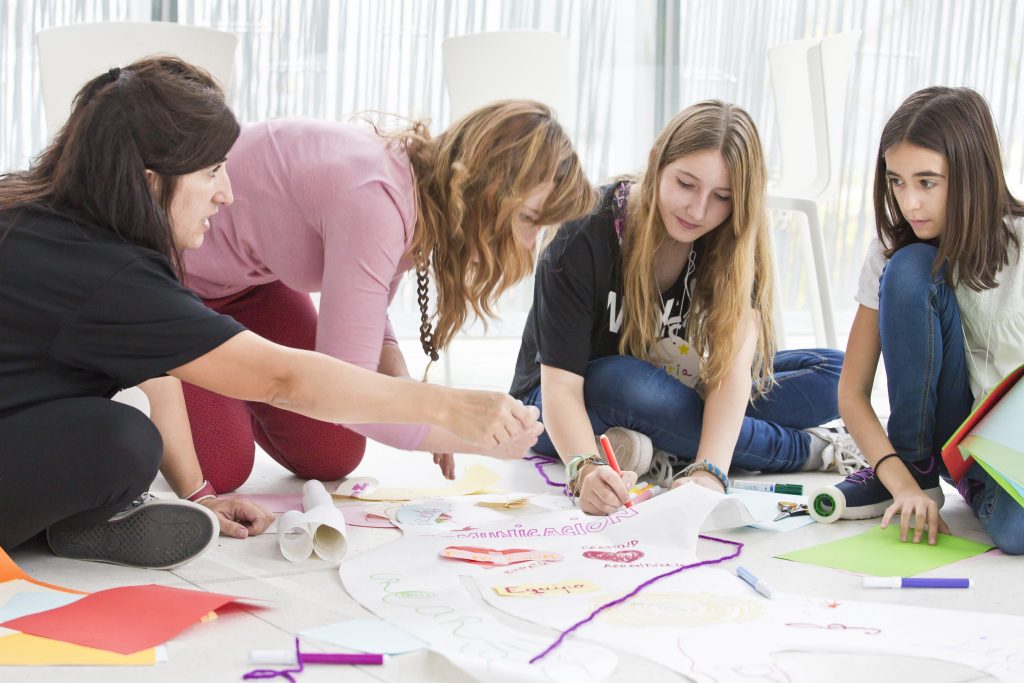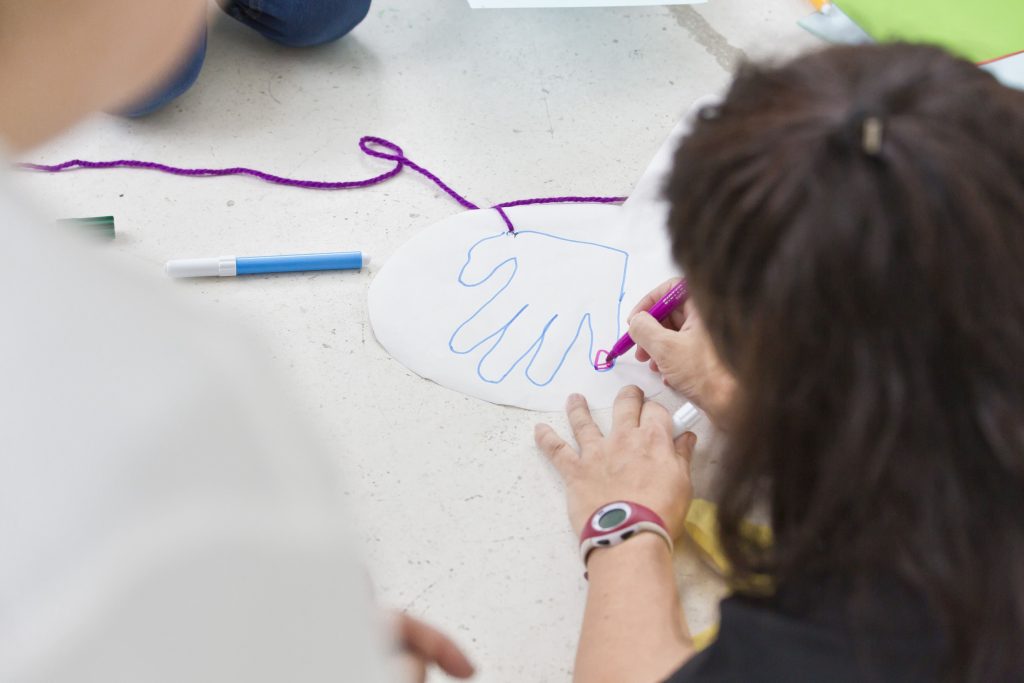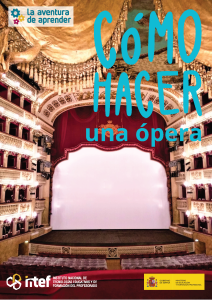Do LÓVA is proposing to your class to become a company and dedicate the entire school year to creating, produce and premiere your own opera. In the functions, the teacher or professor sits in the audience and it is the company that resolves any incident.
LÓVA is a tutoring project, not from an area or subject, because it aims to integrate various areas / subjects of and develop a number of competencies that go beyond the concept of area and fit naturally to the role of a tutor. The greatness of LOVA lives in its integrative capacity.
LÓVA takes place during school hours, It takes place throughout a school year and occupies a number of weekly sessions ranging from six to eleven. Although the centers choose different solutions, language and literature sessions are always integrated, artistic and according to mathematical cases, physical education, securities or other.
Although it is implemented mainly in public centers of primary education, its methodology has been adapted to different educational levels, childish, THAT, special education, high school, and various social environments and cultural associations, Day care centers, jail, etc.
LÓVA strongly recommends that each company is made up of only one class. On the other hand, recommends carrying out the implementation of the project in the center with a class before deciding to do LOVA with two or more companies.


Lova step
The steps that are followed when doing LOVA in the classroom, with slight and logical variations according to the costs, They are as follows:
What is an opera?
What do we need to create a? The class begins a broad search for information and finds out all they can about the operas and the companies that perform them.. You watch videos, fragments are heard, melodies of operas are sung, the professions that intervene in an operatic production are sought.
Identity: form a company
The class reflects on what defines the group, look for a name and a logo that represent these signs.
The class practices challenges (group dynamics in which one person does not win, but the whole group) to understand that you are facing a great challenge, to get to know each other and their reactions to difficulties and to find metaphors that help to understand and guide the process (the class feels like a puzzle in which all the tiles are essential, like a boat in which everyone must row, etc).
Families
Families are informed and adults begin to be involved who can not only help in many ways throughout the course., but they will understand much better the pedagogical guidelines that are being followed to promote learning, meet educational goals, etc.
Professions
Each member of the company is going to carry out a profession and must know it well before applying for that job.. The school is looking for professionals in the performing arts who come to present in brief sessions the most exciting characteristics of their work. Sometimes professions can be presented by girls and boys who did LÓVA last year.
Profession assignment
This is a good day. It is usually done before the Christmas holidays. It is a ceremony in which each member of the company will find out if they can choose the professions they have chosen and for that reason people come to whom the company considers important: a stage director, the director of a theater, the director of the center, etc. The number of professions is not fixed, but they are usually: scenography, communication, characterization and costume, rulership, a vehicle of Learning, illumination, interpretation, musical composition, choreography, dramaturgy and documentation.
The theme of the opera
Very soon, from the beginning of the course, the class has been thinking, reflecting on your identity, on a theme for the opera. It is a reflection that usually takes two and up to three months. The choice of the theme is very important because all the work of the company will be aimed at creating an opera to send this message to the world.. It needs to be a topic that the class as a whole really considers of great importance.
The plot
Although later it will be the job of the team of writers / writers to develop all the dialogues or create the song lyrics, the company will think together the basic plot, that is to say, the scheme of the story that will turn the theme into actions that take place on stage.
In this phase, character creation is vital. They are characters that the company creates following a guideline that is recommended in the LÓVA course: They are five, they have no name or gender and are only defined by internal characteristics (an internal feature is generous, an external one is thin). these characteristics invite to imagine relationships between two characters, then enter three or more. And from there will arise various conflicts, one of them the main conflict of the work,
The company decides, also before starting to imagine the story, the place, space and time in which the action will take place. In this way, all these conditions are invitations to imagine stories and, on the way, they give us essential information to start thinking about scenery, locker room, illumination, etc.
The production
From January-February, the company holds at least one double weekly session dedicated to the production of the work, apart from the other weekly sessions dedicated to LÓVA. The company, guided by your production manager, is divided into professional groups and each group is dedicated, first, to learn to do his job, and then to apply this learning to the construction of the opera. It is the stage of interdependence, since each team works on something that depends on or influences another. Coordination is as important as the work of each professional.
Rehearsals and premiere
From the beginning of the course, a schedule already marks the dates of the different types of rehearsal (partial, with / without wardrobe, with / without music, etc) until the dress rehearsal, which is usually a function for one or more classes of the center, and the premiere, which is sometimes performed in a professional theater and other times in the school's sports hall. There is nothing preconceived in these details and one of the many reasons is that they depend to a large extent on what the company has managed throughout the year. In reality everything is part of a countdown that was written from day one. The schedule is similar to that set by a professional production team. Both time management and the gradual assumption of responsibility are learnings and challenges of the process that the company lives.
In the premiere and other functions, adults do not help because all professional teams know their work and know their interaction with other teams. They don't help and sit in the audience. The premiere is, among other things, the moment of public validation of an emancipation process that needs to begin in the first days of class, when the teacher was leaving decisions that affect the progress of the opera in the hands of the company.
The exhibition is part of the premiere. In it, the documentary crew shows the public that attends the functions photographs, videos, writings, drawings and other artifacts that tell how opera is the result of a long decision-making process, search for answers, abundance of proposals, active participation of many people outside the classroom, etc. The exhibition not only highlights the importance of each and every one of the professions, but of each and every one of the steps of the process.
Evaluation
The last performance must take place weeks before the end of the course. Time needed to evaluate and reflect on what was experienced, analyze the things that have allowed the class to advance more agilely and reach its objectives. In this evaluation, the abundant writings that each student has made reflecting on all the moments are of great value.
Also all the lists and relationships of proposals from the company (proposals for topics to be discussed, company names, options for the first outline of the story, choice of character characteristics or conflicts between them, etc.
Download the INTEF Guide: how to make an opera

